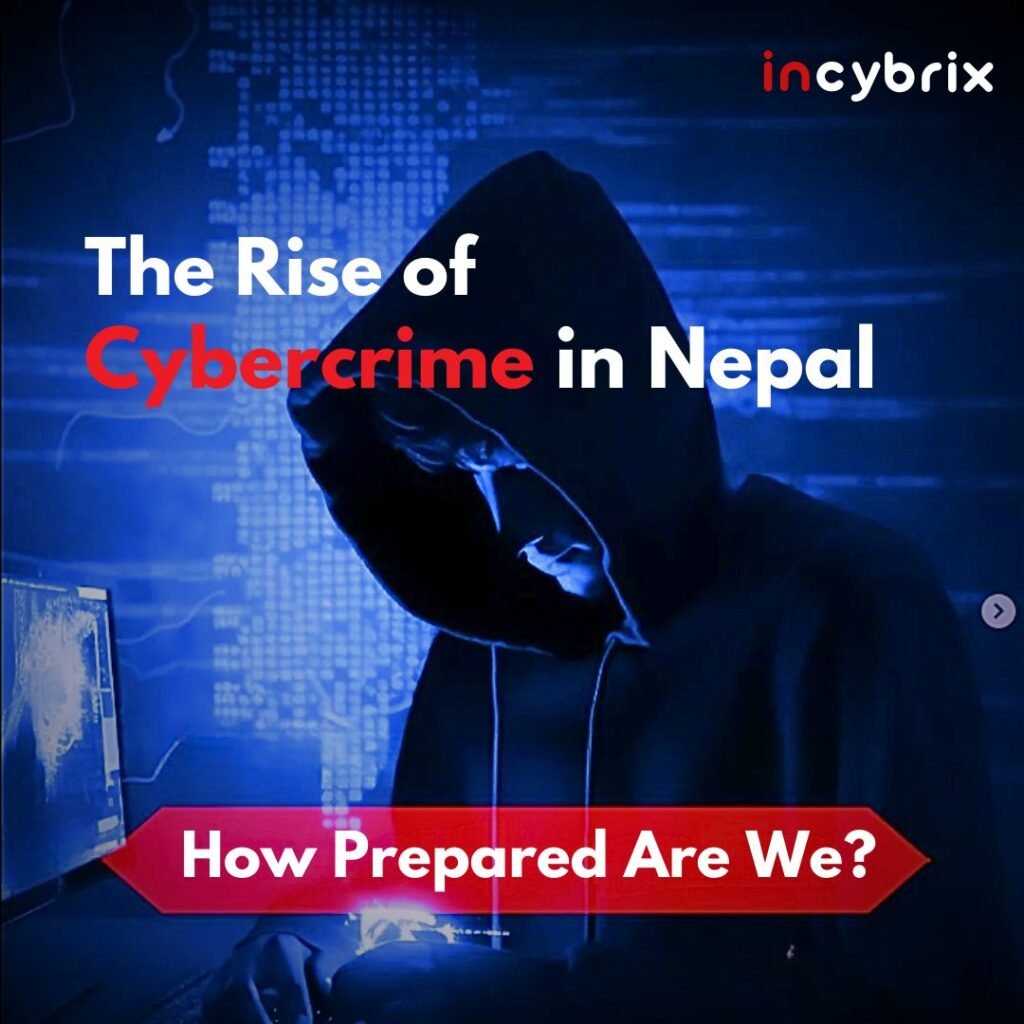Cybercrime in Nepal is on the rise as the country increasingly connects to the global digital landscape. With this increased connectivity, cybercriminals are targeting businesses, government systems, and individuals more than ever, highlighting the urgent need for enhanced cybersecurity measures.
Table of Contents

1️⃣ The Growing Threat Landscape of Cybercrime in Nepal
Cybercrime is no longer limited to large corporations or developed countries. In Nepal, we are witnessing a surge in cyber incidents, with various forms of cybercrime on the rise, including:
- Identity Theft and Fraud: As online banking and digital transactions become commonplace, individuals are increasingly at risk. In recent years, reports indicate a notable increase in financial fraud cases attributed to identity theft.💡 Scenario: A Nepali startup in e-commerce falls victim to a ransomware attack, where the attackers demand a substantial sum of money in exchange for unlocking their critical systems. Without proper backups or security measures, the company faces weeks of downtime and a significant financial loss, ultimately jeopardizing its future.
- Phishing Attacks: Cybercriminals are exploiting human psychology, creating deceptive emails and messages that trick individuals into revealing sensitive information. According to recent statistics, phishing attempts in Nepal have risen by over 30% in the last year alone.💡 Scenario: A business executive receives an email that appears to be from a trusted vendor, prompting them to click a link that leads to a fraudulent site. This results in unauthorized access to company accounts and sensitive data.
- Malware and Ransomware: With the proliferation of remote work and online interactions, malware attacks are becoming increasingly common. Cybercriminals use malware to steal sensitive data, disrupt operations, and demand ransom payments.
2️⃣ Are Nepali Organizations Ready?
Despite the growing number of cyberattacks, many organizations in Nepal remain under-prepared for the threats they face. This lack of preparedness is often attributed to:
- Limited Investment in Cybersecurity Tools and Solutions: Many businesses, especially small and medium enterprises, view cybersecurity as an unnecessary expense rather than a critical investment.
- Lack of Skilled Cybersecurity Professionals: There is a significant shortage of trained cybersecurity professionals in Nepal, making it difficult for organizations to implement effective security measures.
- Poor Awareness and Training Among Employees: A lack of understanding regarding cybersecurity risks leads to complacency. Employees often fall victim to social engineering attacks due to inadequate training.
To address these challenges, businesses in Nepal must adopt proactive cybersecurity measures such as regular vulnerability assessments, employee training, and investment in advanced security technologies.
3️⃣ Government Readiness: Protecting National Assets
The government plays a crucial role in safeguarding critical infrastructure, public services, and citizens’ data. However, there are gaps in the current approach:
- Inadequate Cybersecurity Framework: While regulations like the NTA Byelaw 2077 and NRB Guidelines exist, their implementation and enforcement need strengthening.
- Collaboration Gaps: A disconnect between government agencies and private sector cybersecurity efforts limits the effectiveness of national cyber defense strategies.
💡 Scenario: A breach in the healthcare system exposes the personal health data of thousands of Nepali citizens. Such incidents highlight the need for improved cyber hygiene and robust security measures across all sectors.
To be prepared, the Nepali government must:
- Strengthen adherence to cybersecurity regulations and develop a comprehensive national cybersecurity strategy.
- Build robust cyber defense systems to protect critical infrastructure.
- Foster collaboration between public and private sectors to enhance cybersecurity strategies.
4️⃣ What Can We Do as Individuals to Prevent Cybercrime in Nepal?
Cybercrime isn’t just a problem for businesses and governments—it affects everyday citizens too. Awareness and individual action are vital to mitigating risks.
💡 Scenario: A person’s mobile banking credentials are stolen after they use an unsecured public Wi-Fi network.
Simple Steps Everyone Can Take:
- Use Strong, Unique Passwords: Ensure that passwords are complex, utilizing a mix of letters, numbers, and symbols. Tools like password managers can help manage unique passwords across different platforms.
- Be Cautious of Phishing Emails and Suspicious Links: Always verify the sender’s email address and avoid clicking on links from unknown sources.
- Enable Two-Factor Authentication: Adding an extra layer of security to accounts, especially for email and banking, significantly reduces the risk of unauthorized access.
- Regularly Update Software and Applications: Keeping systems updated helps patch vulnerabilities that cybercriminals can exploit.
- Educate Family and Friends: Sharing knowledge about cyber threats within your community can create a more informed public, making it harder for cybercriminals to succeed.
5️⃣ Community Awareness and Involvement
Raising awareness in communities is crucial for a collective defense against cyber threats. Initiatives such as workshops, seminars, and online webinars can help educate the public about risks and protective measures against cybercrime.
- Engage Local Organizations: Partner with local NGOs and community groups to spread awareness about cybersecurity best practices.
- Promote Cyber Hygiene: Regular campaigns focusing on cyber hygiene can significantly impact overall cybersecurity awareness in communities.
6️⃣ Incybrix’s Role in Building a Secure Nepal
At Incybrix, we recognize the growing need for cybersecurity in Nepal and are committed to helping businesses, governments, and individuals protect themselves. Our focus is on:
- Research and Development: We invest in innovative security products that address the specific challenges faced by Nepali organizations.
- VAPT and IS Audit Services: We offer tailored vulnerability assessment and penetration testing (VAPT) and information system audit services, ensuring compliance with Nepali regulations and global standards.
- Training and Awareness Programs: Our training programs empower employees, businesses, and individuals to defend against cybercrime, fostering a culture of security awareness.
- Continuous Support and Consultation: We provide ongoing support and consultation services to help organizations adapt to the evolving cyber threat landscape.
Contact Us Today!
Let’s work together to safeguard your digital presence. Reach out to us at Incybrix to learn more about our cybersecurity solutions tailored to meet the unique needs of Nepal.